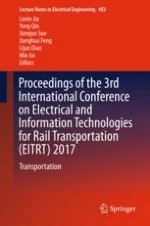2018 | OriginalPaper | Buchkapitel
A Multi-objective Programming Model for Subway Last Train Timetabling
verfasst von : Wanxiao Xiang, Yanhui Wang
Erschienen in: Proceedings of the 3rd International Conference on Electrical and Information Technologies for Rail Transportation (EITRT) 2017
Verlag: Springer Singapore
Aktivieren Sie unsere intelligente Suche, um passende Fachinhalte oder Patente zu finden.
Wählen Sie Textabschnitte aus um mit Künstlicher Intelligenz passenden Patente zu finden. powered by
Markieren Sie Textabschnitte, um KI-gestützt weitere passende Inhalte zu finden. powered by
